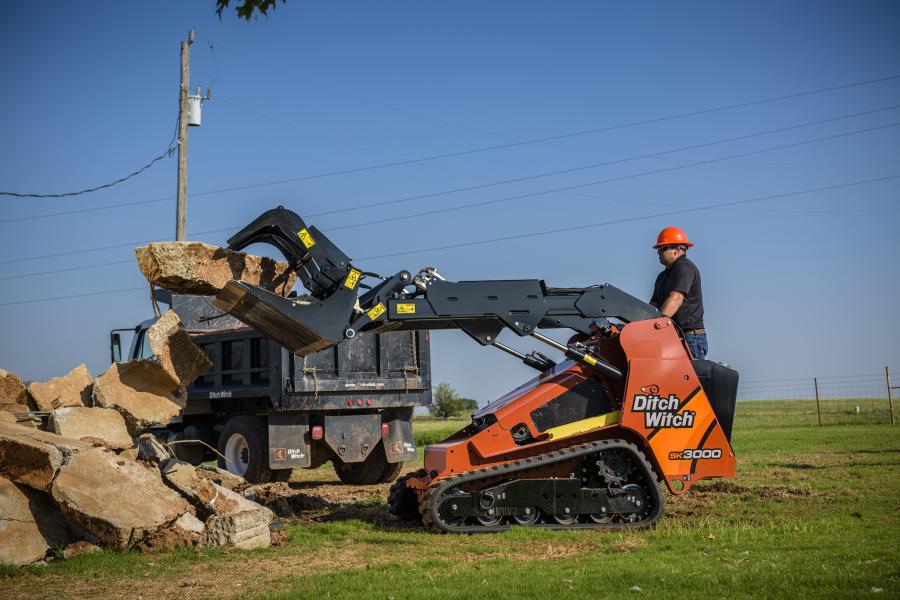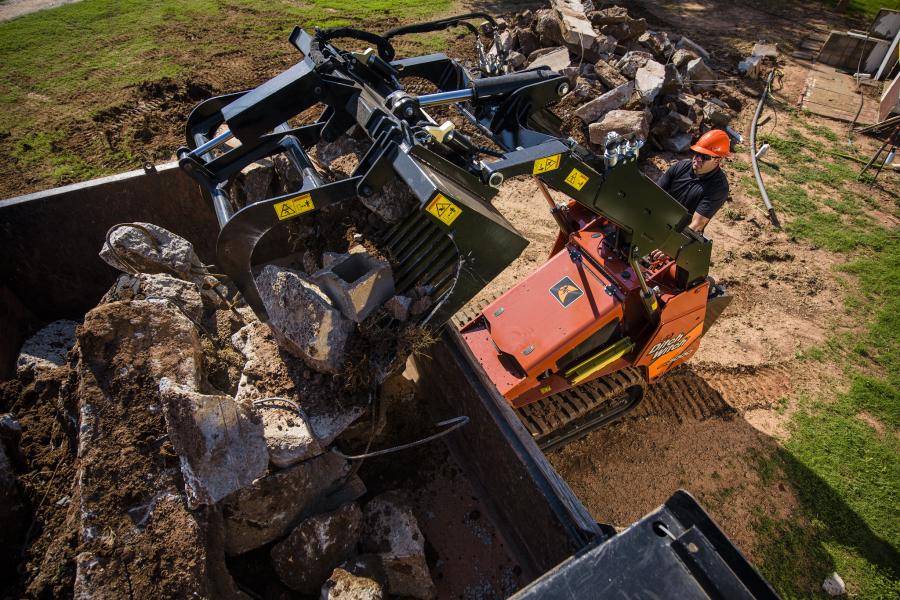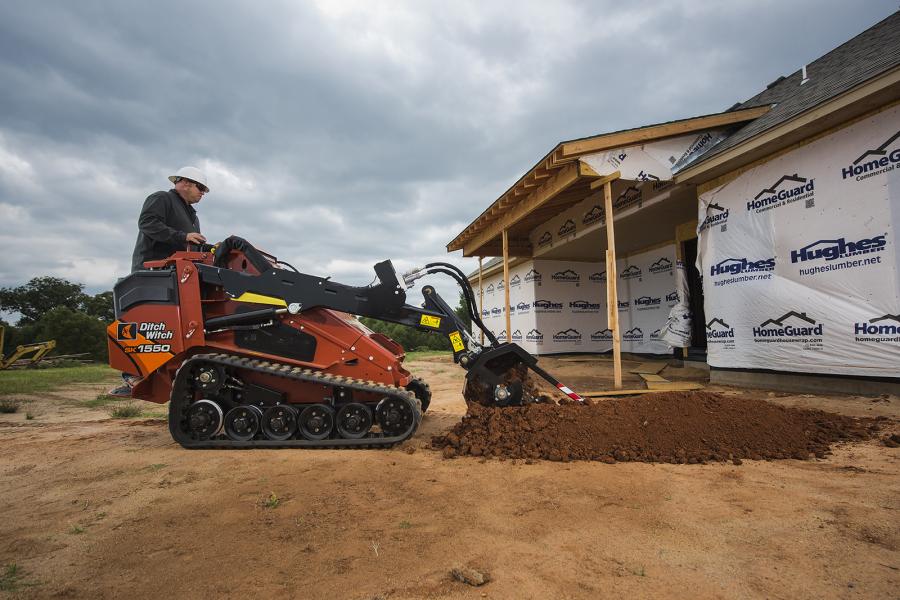
Tue March 29, 2022
Brant Kukuk — Ditch Witch
Hardscape, landscape and tree care professionals are feeling the heat, and it is not because of the warmer months approaching.
The increased demand for work, tighter deadlines and the industry's ongoing labor shortage are issues many contractors face. In fact, according to the 2021 Green Industry Benchmark Report, attracting and retaining employees is the most frequently cited issue for landscapers with 70 percent of respondents reporting difficulties in finding workers.
While the labor shortage is enough to make any contractor sweat, many are looking to their equipment to help them do more with less workers.
One machine that is alleviating some of the pressure is the stand-on skid steer. With its increased power, easy maneuverability and maximum versatility, these machines are helping smaller crews stay productive, meet deadlines and boost jobsite efficiency. And, with the ability to effortlessly switch out a variety of attachments, contractors can ensure their smaller crews stay successful.
But with a plethora of attachments to choose from, it can be hard for contractors to know which attachments will maximize their ROI. Here are three stand-on skid steer attachments that will help contractors mitigate the pressures of the industry's labor shortage.

Grapple Bucket
The bucket attachment is the bread and butter of attachments for most stand-on skid steer operators and is the ideal attachment for smaller crews. It helps operators safely lift and carry large piles of material that need to be relocated or disposed of on a job site.
There are a variety of bucket types to choose from depending on the application, including a dirt bucket, 4-in-1 bucket and grapple bucket.
A grapple bucket is similar to the standard bucket, but with hydraulic clamps, so it can be used to hold unstable materials such as tree branches, stumps, large boulders, unstable bricks and other landscape materials.
For example, if a contractor needed to move a heavy tree branch across a job site, a grapple attachment equipped with a large stand-on skid steer would allow the operator to move the branch in one trip. Without a grapple bucket and a large skid steer, the crew would need to take time to cut the branch up into smaller pieces that could be carried by hand or pieces that would fit into a standard bucket.
Trencher
While dedicated trenchers are incredibly popular and certainly have a place in underground construction, trencher attachments offer an efficient alternative.
Trencher attachments for stand-on skid steers are typically available in 4-, 6- and 8-in. widths and are ideal for installing everything from irrigation and drainage systems to utilities and fiber.
The biggest benefit of a trencher attachment is that it eliminates the need for a second machine on a job site, which benefits contractors dealing with a labor shortage in two ways. First, by eliminating time needed for maintenance or transportation of a second machine and giving the crew valuable minutes back in their day. And second, by cutting back on training time needed to learn multiple machines, which enables new employees to start contributing to the jobsite immediately.
Hydraulic Power Fork
A hydraulic power fork is an essential attachment for loading and unloading material from a trailer or truck bed and moving it across tricky terrain. It's useful when moving materials like sod, bricks, trees and ornamental garden boulders.
One key benefit of a hydraulic power fork for smaller crews is that operators can adjust the tines with intuitive controls on the machine, rather than having to adjust them manually. This eliminates the need for crews to get on and off the machine to adjust the tines, helping them save time and ultimately helping contractors maximize staff productivity and move from one job to the next more quickly.

Attachments Up and Running
Staying efficient with smaller crews means having to increasingly rely on your machines to help you stay productive. That's why contractors are turning to stand-on skid steer attachments to help them alleviate the challenges brought on by the labor shortage.
In one example, Justin Moseley, project manager of Nelson Landscaping, a landscape company based in Oklahoma City, Okla., attributes attachments as the reason why stand-on skid steers have become so invaluable to their operation. In fact, every Nelson Landscaping crew has a bucket, fork and/or a trencher attachment on the job site.
"That's what we use on a daily basis," Moseley said. "It's easy to use all different attachments that we need to have. Most of our places that we go to, we're installing the sprinkler system, we're doing the landscaping, we're installing these big boulders [and] decent-sized trees."
Additionally, when it comes to labor, Moseley credits the stand-on skid steer for making his crew much more productive and why it feels like they have additional crew support on the job site.
"It's doubling your work power, essentially," he said. "It takes our labor force needs, and it almost cuts it in half."
Nelson Landscaping is just one example of an operation that is leaning on their equipment to help boost jobsite efficiency and fill staffing gaps. While the grapple bucket, trencher attachment and hydraulic fork are three of the most popular attachments to help maximize productivity, there are a variety of attachments that can help operators improve the bottom line. From rakes and backhoes to augers and microtrenchers, finding the right attachments will be imperative to keeping smaller crews successful and efficient.
This story also appears on Construction Equipment Guide.
 Agricultural Equipment
Agricultural Equipment Articles
Articles Sign up for Updates
Sign up for Updates Sell Your Machines
Sell Your Machines

 Agricultural Equipment
Agricultural Equipment Agricultural Dealers
Agricultural Dealers Agricultural Articles
Agricultural Articles Sign up for Updates
Sign up for Updates Sell Your Machines
Sell Your Machines